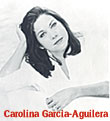|
Esta página no está disponible en español.
HISPANIC MAGAZINE
A Ray Of Light For Hispanic Authors
By Fabiola Santiago
March, 2002
Copyright © 2002 HISPANIC MAGAZINE. All Rights Reserved.
 Miami mystery writer Carolina García-Aguilera is known for her breezy, page-turner novels starring the sassy cubanita private-eye Lupe Solano. In fiction, as she once did in real life, the Cuban American novelist tackles quirky cases like Cuban art and baby smuggling rings that operate in the shadows of the city’s most glamorous neighborhoods. Miami mystery writer Carolina García-Aguilera is known for her breezy, page-turner novels starring the sassy cubanita private-eye Lupe Solano. In fiction, as she once did in real life, the Cuban American novelist tackles quirky cases like Cuban art and baby smuggling rings that operate in the shadows of the city’s most glamorous neighborhoods.
But this summer, García-Aguilera is giving her own literary career a riveting twist: The giant U.S. book publisher HarperCollins is launching her first romance novel, One Hot Summer, the story of a 32-year-old Cuban American lawyer from Miami torn between family and professional obligations when an old lover from Duke University shows up in her life. As the novel opens, Margarita Santos Silva is on her way to a funeral, an all-night Cuban velorio with her two best friends.
"This too is a page-turner," García-Aguilera says. "It’s a fun book, but it addresses serious issues like family and duty. Family is paramount in all my books."
Cuban culture plays a major role in García-Aguilera’s novels, but the stories have a universal appeal that crosses borders—a factor HarperCollins is hoping will turn One Hot Summer into one hot title for Rayo, the prestigious publishing house’s new imprint dedicated to books "by Latinos and for Latinos."
With a range of bilingual titles that run from romance to analytical essays on the impact of Hispanics in the United States, Rayo is hoping to position itself as the premier publisher of Hispanic writers in English and Spanish.
"Our goal is to get our Latino authors in the bestseller lists and Rayo is a way to organize and create new voices and talents," says René Alegría, Rayo’s editorial director.
The imprint, which made its debut last fall with launching events in New York, Miami and Los Angeles, is publishing about 12 books a year. The first title, Thirteen Senses, a family memoir by Mexican American author Víctor Villaseñor, has made several best-seller lists in predominantly Hispanic states, Alegría says. The book and Villaseñor’s preceding popular memoir, Rain of Gold, are being billed as epic stories similar to that of African American Alex Haley’s Roots.
García-Aguilera’s novel, the publisher has announced, "illustrates a new cultural literary genre that combines the glamorous drama inherent in Spanish-language soap operas (telenovelas) with true American feminist empowerment."
But the novelist is banking on her mystery-writing skills and the cross cultural theme of personal vs. professional to appeal to her fan base, which does transcend the Hispanic market.
"I consider myself totally crossover," García-Aguilera says. "I started in the mystery genre, got known, won awards—I won the top private eye award for my book Havana Heat—so I don’t consider myself a Latina writer. I started in a genre that is Anglo-Saxon. In One Hot Summer, the character is Cuban, but it’s not just about being Latina. I’m a mystery writer with the added attraction that my character is Latina. I straddle both worlds."
That’s precisely the added value of Hispanic writers, says Alegría, who came up with the idea for Rayo (which means a flash of lightning) out of his own frustrations as a reader. As a Mexican American from Arizona, Alegría found himself going to bookstores and "feeling that we were not represented the way we needed to be."
"There was such an absence," Alegría says. "Sure, we had some of our Latino and Latina contemporary authors, and authors from Latin America who influenced all of us, but there wasn’t an organized forum from where we could hear the voices and market them the way they need to be marketed."
 He modeled Rayo after successful African American imprints, hoping that a specialized imprint can be a better vehicle to target the Hispanic reading public and promote Hispanic authors and their work. At Rayo, writers will get special attention and books will not only be sold in book stores, but in non-traditional places where Hispanics shop and gather to socialize. He modeled Rayo after successful African American imprints, hoping that a specialized imprint can be a better vehicle to target the Hispanic reading public and promote Hispanic authors and their work. At Rayo, writers will get special attention and books will not only be sold in book stores, but in non-traditional places where Hispanics shop and gather to socialize.
"We need to teach the industry how to get these books out there—and get them to succeed. We have to get them to understand that the Hispanic community is a viable book-buying community," Alegría says. "We market and publicize these books bilingually, in Spanish and English. Our authors give interviews one day to El Diario and another day speak on the Today show. It’s navigating the media to conform to Latin tastes, to find the magical combination of English and Spanish publicity. That’s the key."
One of the authors Rayo is launching in English is Univisión network anchor Jorge Ramos, one of the best known faces in Hispanic America and already a published writer in Spanish with respectable book sales.
Ramos’ four Spanish-language titles have sold nearly 150,000 copies in the continental United States. Readers pack his appearances. Some 2,000 people showed up to a Ramos reading at a barber shop-book store in Santa Ana, California. His new book, The Other Face of America, a translation from Spanish, is among the first Rayo titles to provide extensive analysis about the Hispanic experience in the United States. Since its January launching, Ramos has been featured on the Today and The O’Reilly Factor television shows.
"O’Reilly could not stop talking about him all week and referred to him as ‘the powerful Jorge Ramos,’ " Alegría says. "He is having an impact on the way people view immigrants."
Ramos says he sees the U.S. publishing world as "the last
frontier" for Hispanics to conquer. "Latinos are everywhere in the mass media—radio, television, newspapers—and these publishing houses with millions of titles and dollars haven’t realized the huge market potential, the very profitable venture in the Hispanic community," Ramos says. "There is not one single company dominating the market. They are really behind."
Insiders in the publishing world agree and welcome the launching of Rayo as a milestone, perhaps the first Latino imprint established by a major U.S. house. Random House and Simon & Schuster have Spanish-language divisions that mostly publish translations of English-language bestsellers. They too, however, are moving to launch new Latino writers like Univisión anchor Teresa Rodríguez, who is under contract to finish writing a novel this year.
So far, Rayo’s list of authors resembles that of the major Hispanic groups in the United States—Mexican, Cuban and Puerto Rican. But says Alegría: "I’m not interested in filling quotas, but in representing in what we publish the diversity in the Hispanic population."
Operating under the motto "One culture—two languages," the imprint’s first spring list is a mix of new novels originally written in English and translated work. Issued in February in both English and Spanish, the novel The Wise Women of Havana by José Raúl Bernardo is set in 1930s Cuba, and is billed as "a passionate, provocative story of love, family and honor." Bernardo, whose first novel, The Secret of the Bulls, earned him critical acclaim, came to the United States as a refugee in 1960. He worked on a tomato plantation in Florida then moved to New York City, where he earned a doctorate degree from Columbia University. He now lives near the Catskill Mountains of New York.
"He and Carolina and Jorge and Víctor are authors who can promote their work in two languages," Alegría says.
Long established Hispanic authors welcome Rayo’s launching, but with some hesitation. Although they see merit in the HarperCollins project, some fear "the ghettoizing" of Latino authors and question whether it’s a positive move to be published under a separate imprint.
"Why not put Latinos with the rest of American writers?" says novelist Julia Alvarez, a Dominican American who lives in Vermont. Alvarez, who teaches at Middlebury College in Vermont, likens what’s happening in publishing to the debate in English departments about whether to teach Latino and African-American literature as part of a course on American literature or to dedicate special topics to them.
"You don’t have a course called White Male Southern Writers and put Faulkner [there]," Alvarez says.
The HarperCollins project, she says, is "like a foot in the door."
"But aren’t we past the foot in the door? That’s why we feel ambivalent," Alvarez says. Alegría says Rayo "is more than a foot in the door."
"It’s pounding down the door and announcing in a big way that we are American voices, we are Latino voices."
| 
